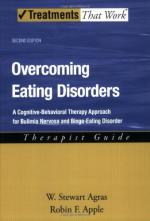|
This section contains 596 words (approx. 2 pages at 300 words per page) |

|
Overeating, a behavior not always limited to persons with BULIMIA, is grouped together with substance abuse and dependence in a superfamily of disorders designated as behavioral (non-substance-related) addictions. The term impulse control disorders has been used by some clinicians to describe these behaviors. In this context the notion of ADDICTION centers on the repetitiveness of the behavior and would include such behaviors as compulsive spending, compulsive gambling, pathological overeating (bulimia), hypersexuality, kleptomania (repetitive, compulsive stealing when there is no need), as well as miscellaneous obsessive-compulsive behaviors such as tics and hair-pulling (trichotillomania). Some researchers have pointed out similarities among these disorders and believe that there may be similar brain mechanisms involved in some of them. For example, it has been shown that DOPAMINE levels in certain areas of the brain (such as NUCLEUS ACCUMBENS) are elevated by the ingestion of...
|
This section contains 596 words (approx. 2 pages at 300 words per page) |

|


